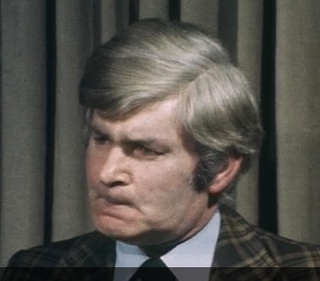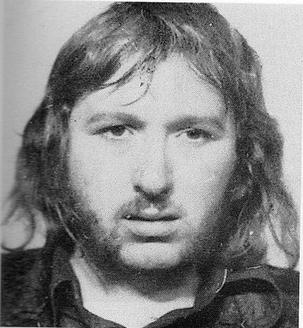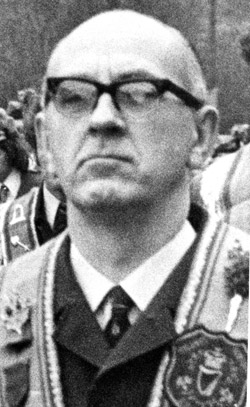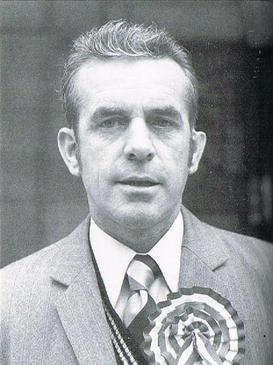Related Research Articles

The Ulster Volunteer Force (UVF) is an Ulster loyalist paramilitary group based in Northern Ireland. Formed in 1965, it first emerged in 1966. Its first leader was Gusty Spence, a former British Army soldier from Northern Ireland. The group undertook an armed campaign of almost thirty years during The Troubles. It declared a ceasefire in 1994 and officially ended its campaign in 2007, although some of its members have continued to engage in violence and criminal activities. The group is a proscribed organisation and is on the terrorist organisation list of the United Kingdom.
A loyalist feud refers to any of the sporadic feuds which have erupted almost routinely between Northern Ireland's various loyalist paramilitary groups during and after the ethno-political conflict known as the Troubles broke out in 1969. The feuds have frequently involved problems between and within the Ulster Defence Association (UDA) and the Ulster Volunteer Force (UVF) as well as, later, the Loyalist Volunteer Force (LVF).
The Combined Loyalist Military Command is an umbrella body for loyalist paramilitary groups in Northern Ireland set up in the early 1990s, recalling the earlier Ulster Army Council and Ulster Loyalist Central Co-ordinating Committee.
Billy "Hutchie" Hutchinson is an Ulster Loyalist politician serving as the leader of the Progressive Unionist Party (PUP) since 2011. He was elected to Belfast City Council in the 1997 elections. Hutchinson was a Member of the Northern Ireland Assembly (MLA) for Belfast North from 1998 to 2003. He lost his assembly seat in 2003, and his council seat in 2005. He returned to the council in 2014 and was re-elected in 2019 though he later lost his seat in 2023. Before this he had been a member of the Ulster Volunteer Force (UVF) and was a founder of their youth wing, the Young Citizen Volunteers (YCV).

Augustus Andrew Spence was a leader of the paramilitary Ulster Volunteer Force (UVF) and a leading loyalist politician in Northern Ireland. One of the first UVF members to be convicted of murder, Spence was a senior figure in the organisation for over a decade.
Tara was an Ulster loyalist movement in Northern Ireland that espoused a brand of evangelical Protestantism. Preaching a hard-line and somewhat esoteric brand of loyalism, Tara enjoyed some influence in the late 1960s before declining amid a high-profile sex abuse scandal involving its leader William McGrath.

John Dunlop McKeague was a Northern Irish loyalist and one of the founding members of the paramilitary group the Red Hand Commando in 1970. Authors on the Troubles in Northern Ireland have accused McKeague of involvement in the Kincora Boys' Home scandal but he was never convicted. He was shot dead by the Irish National Liberation Army (INLA) in Belfast in January 1982.

Robert William Bates was a Northern Irish loyalist. He was a member of the Ulster Volunteer Force and the infamous Shankill Butchers gang, led by Lenny Murphy.

William McGrath was a loyalist from Northern Ireland who founded the far-right organisation Tara in the 1960s, having also been prominent in the Orange Order until his expulsion due to his paedophilia. A house master in Kincora Boys' Home in East Belfast, in 1981 he was jailed for four years for paedophile activities at the Home.

Frankie Curry was a Northern Irish loyalist who was involved with a number of paramilitary groups during his long career. A critic of the Northern Ireland peace process, Curry was killed during a loyalist feud.
Alex Kerr was a Northern Irish former loyalist paramilitary. Kerr was a brigadier in the Ulster Defence Association (UDA)'s South Belfast Brigade. He is no longer active in loyalism.

William Mitchell was a Northern Ireland loyalist, community activist and member of the Progressive Unionist Party. Mitchell was a leading member of the loyalist Ulster Volunteer Force (UVF) and served a life sentence for his part in a double murder. He later abandoned his UVF membership and took up cross-community work.

Kenneth Gibson was a Northern Irish politician who was the Chairman of the Volunteer Political Party (VPP), which he had helped to form in 1974. He also served as a spokesman and Chief of Staff of the loyalist paramilitary organisation, the Ulster Volunteer Force (UVF).
UVF Mid-Ulster Brigade formed part of the loyalist paramilitary Ulster Volunteer Force in Northern Ireland. The brigade was established in Lurgan, County Armagh in 1972 by its first commander Billy Hanna. The unit operated mainly around the Lurgan and Portadown areas. Subsequent leaders of the brigade were Robin Jackson, known as "The Jackal", and Billy Wright. The Mid-Ulster Brigade carried out many attacks, mainly in Northern Ireland, especially in the South Armagh area, but it also extended its operational reach into the Republic of Ireland. Two of the most notorious attacks in the history of the Troubles were carried out by the Mid-Ulster Brigade: the 1974 Dublin and Monaghan bombings and the Miami Showband killings in 1975. Members of the Mid-Ulster Brigade were part of the Glenanne gang which the Pat Finucane Centre has since linked to at least 87 lethal attacks in the 1970s.

Ernest "Ernie" Elliott, nicknamed "Duke", was a Northern Irish loyalist activist and a leading member of the Ulster Defence Association (UDA) during its early days. Unusually for the generally right-wing UDA, Elliott expressed admiration for socialism and communism, and frequently quoted the words of Che Guevara and Karl Marx. Elliott was eventually killed by a fellow UDA member following a drunken brawl, although his death was variously blamed on republicans and a rival faction within the UDA.

James Trevor King, also known as "Kingso", was a British Ulster loyalist and a senior member of the Ulster Volunteer Force (UVF). He was commander of the UVF's "B" Company, 1st Belfast Battalion, holding the rank of lieutenant colonel. On 16 June 1994, he was one of three UVF men gunned down by the Irish National Liberation Army as he stood on the corner of Spier's Place and the Shankill Road in West Belfast, close to the UVF headquarters. His companion Colin Craig was killed on the spot, and David Hamilton, who was seriously wounded, died the next day in hospital. King was also badly injured; he lived for three weeks on a life-support machine before making the decision himself to turn it off.
John "Bunter" Graham is a long-standing prominent Ulster loyalist figure. Born in the Lower Shankill, Graham rose quickly through the ranks of the Ulster Volunteer Force (UVF), joining other UVF leaders at a rally at Stormont in 1974 to celebrate the collapse of power sharing.
Jackie Mahood is a Northern Irish former loyalist activist with both the Ulster Volunteer Force (UVF) and Progressive Unionist Party (PUP). He later split from these groups and became associated with the breakaway Loyalist Volunteer Force (LVF), founded in 1996 by Billy Wright.

The Young Citizen Volunteers of Ireland, or Young Citizen Volunteers (YCV) for short, was a British civic organisation founded in Belfast in 1912 which later became the youth wing of Ulster loyalist paramilitary group the Ulster Volunteer Force. It was established to bridge the gap for 18 to 25 year olds between membership of youth organisations—such as the Boys' Brigade and Boy Scouts—and the period of responsible adulthood. Another impetus for its creation was the failure of the British government to extend the legislation for the Territorial Force—introduced in 1908—to Ireland. It was hoped that the War Office would absorb the YCV into the Territorial Force, however such offers were dismissed. Not until the outbreak of World War I did the YCV—by then a battalion of the UVF—become part of the British Army as the 14th Battalion of the Royal Irish Rifles.
Christopher Hudson is an Irish former trade union activist who subsequently became a Unitarian minister in Northern Ireland. During the final years of the Troubles Hudson became prominent as a negotiator between the loyalist Ulster Volunteer Force (UVF) and the Irish government and played a key role helping to deliver the Northern Ireland peace process.
References
- 1 2 Jim Cusack & Henry McDonald, UVF, Poolbeg, 1997, p. 21
- 1 2 Ed Moloney, Voice from the Grave, Faber & Faber, 2010, p. 334
- ↑ Moloney, Voice from the Grave, p. 375
- ↑ Steve Bruce, The Red Hand, Oxford University Press, 1992, p. 147
- ↑ Cusack & McDonald, UVF, p. 87
- ↑ Cusack & McDonald, UVF, pp. 94–96
- 1 2 3 Cusack & McDonald, UVF, p. 96
- ↑ Cusack & McDonald, UVF, p. 95
- ↑ Steve Bruce, The Red Hand: Protestant paramilitaries in Northern Ireland, Oxford University Press, 1992, p. 117
- ↑ "Dublin and Monaghan bombings: Cover-up and incompetence". page 1. Politico. Joe Tiernan. 3 May 2007